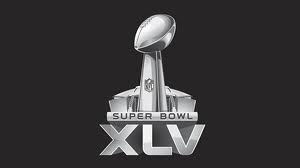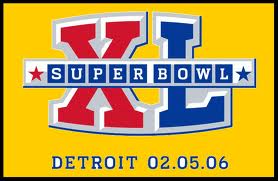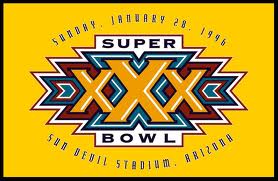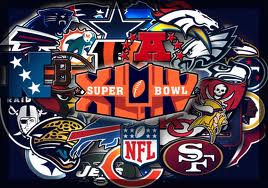- Pictures
- Links
-
Hunting
- Racing
He Super Bowl is the championship game of the National Football League (NFL), the highest level of professional
 American football in the United States, culminating a season that begins in the late summer of the previous calendar year. The Super Bowl uses Roman numerals to identify each game, rather than the year in which it is held. For example, Super Bowl I was played on January 15, 1967, following the regular season played in 1966, while Super Bowl XLV was played on February 6, 2011, to determine the champion of the 2010 regular season.[1]
American football in the United States, culminating a season that begins in the late summer of the previous calendar year. The Super Bowl uses Roman numerals to identify each game, rather than the year in which it is held. For example, Super Bowl I was played on January 15, 1967, following the regular season played in 1966, while Super Bowl XLV was played on February 6, 2011, to determine the champion of the 2010 regular season.[1]
The game was created as part of a merger agreement between the NFL and its then-rival league, the American Football League (AFL). It was agreed that the two leagues' champion teams would play in an AFL–NFL World Championship Game until the merger was to officially begin in 1970. After the merger, each league was redesignated as a "conference", and the game was then played between the conference champions.
The day on which the Super Bowl is played is now considered a de facto American national holiday,[2][3][4] called "Super Bowl Sunday". It is the second-largest day for U.S. food consumption, after Thanksgiving Day.[5] In addition, the Super Bowl has frequently been the most watched American television broadcast of the year. Super Bowl XLV played in 2011 became the most watched American television program in history, drawing an average audience of 111 million viewers and taking over the spot held by the previous year's Super Bowl, which itself had taken over the #1 spot held for twenty-eight years by the final episode of M*A*S*H.[6] The Super Bowl is also among the most watched sporting events in the world, mostly due to North American audiences, and is second to Association football's UEFA Champions League final as the most watched annual sporting event worldwide.[7]
Because of its high viewership, commercial airtime during the Super Bowl broadcast is the most expensive of the
year. Due to the high cost of investing in advertising on the Super Bowl, companies regularly develop their most expensive advertisements for this broadcast. As a result, watching and discussing the broadcast's commercials has become a significant aspect of the event.[8] In addition, many popular singers and musicians have performed during the event's pre-game and halftime ceremonies because of the exposure.
The Super Bowl was created as part of the merger agreement between the National Football League (NFL) and its competitive rival, the American Football League (AFL). After its inception in 1920, the NFL fended off several rival leagues before the AFL began play in 1960. The intense competitive war for players and fans led to serious merger talks between the two leagues in 1966.
The name derives from a college football game which started in Pasadena, CA in 1902, was subsequently named the Tournament of Roses, and which moved to the Rose Bowl stadium in 1923. The Pasadena stadium was called "Rose" because it was built to host the Tournament of Roses football game, and "Bowl" because it resembles a bowl. Demonstrating a confusion between its venue and the contest itself, the Tournament of Roses soon became known as the Rose Bowl. Exploiting the popularity of the Rose Bowl stadium and the college championship game of the same name, the Orange Bowl and Sugar Bowl football games were created in 1935, followed by the Cotton Bowl in 1937 (at a bowl-shaped stadium called the Cotton Bowl in Dallas, Texas). "Bowl" thus became a standard term, and other "bowl games" were created in later years. The NFL championship started in 1967 when the bowl games were already well known to football fans.
The NFL and AFL agreed to merge before the 1966 season. The first championship game between the two leagues' champions was to take place after that season. Kansas City Chiefs owner Lamar Hunt first used the term "Super Bowl" to refer to this game in the merger meetings. Hunt would later say the name was likely in his head because

his children had been playing with a Super Ball toy. (A vintage example of the ball is on display at the Pro Football Hall of Fame in Canton, Ohio.) In a July 25, 1966, letter to NFL commissioner Pete Rozelle, Hunt wrote, "I have kiddingly called it the 'Super Bowl,' which obviously can be improved upon." Although the leagues' owners decided on the name "AFL-NFL Championship Game," the media immediately picked up on Hunt's "Super Bowl" name, which would become official beginning with the third annual game.[9]
After the NFL's Green Bay Packers won the first two Super Bowls, some team owners feared for the future of the merger. At the time, many doubted the competitiveness of AFL teams compared with NFL counterparts, though that perception changed with the AFL's New York Jets' defeat of the Baltimore Colts in Super Bowl III in Miami. One year later, the AFL Kansas City Chiefs defeated the NFL Minnesota Vikings 23–7 and won Super Bowl IV in New Orleans, the final world championship game played between the champions of the two leagues, as the league merger finally took place later that year. Beginning with the 1970 season, the former AFL teams and three NFL teams formed the American Football Conference and the remaining NFL teams formed the National Football Conference, with the AFC and NFC champions meeting in each year's Super Bowl.
The game is played annually on a Sunday as the final game of the NFL Playoffs. Originally, the game took place in early to mid-January, following a fourteen-game regular season and two rounds of playoffs. Over the years, the date of the Super Bowl has progressed from the second Sunday in January, to the third, then the fourth Sunday in January; the game is currently played on the first Sunday in February, given the current seventeen-week (sixteen games and one bye week) regular season and three rounds of playoffs. Also, February is television's "sweeps" month and it affords the television network carrying the game an immense opportunity to pad its viewership when negotiating for advertising revenue. The progression of the dates of the Super Bowl was caused by several factors: the expansion of the NFL's regular season in 1978 from fourteen games to sixteen; the expansion of the pre-Super Bowl playoff field from eight to twelve teams, necessitating the addition of a third round of playoffs (also in 1978)[clarification needed]; the addition of the regular season bye-week in the 1990s; and the decision to start the regular season the week following Labor Day.
The winning team receives the Vince Lombardi Trophy, named after the coach of the Green Bay Packers, who won the first two Super Bowl games and three of the five preceding NFL championships in 1961, 1962, and 1965. Following his death in September 1970, the trophy was named the Vince Lombardi Trophy, and was first awarded as such to the Baltimore Colts at Super Bowl V in Miami. [edit] Game history
 The Pittsburgh Steelers have won six Super Bowls, while two other teams, the Dallas Cowboys and the San Francisco 49ers, have each won five. Fourteen other NFL franchises have won at least one Super Bowl. Only four active NFL franchises, the Cleveland Browns, Detroit Lions, Jacksonville Jaguars and the Houston Texans, have not appeared in the Super Bowl: The Browns and Lions have both won NFL championships prior to the Super Bowl era, while the Jaguars (who joined the NFL in 1995) and Texans (2002) joined the league after the era began.
[edit] 1966-1967: Packers early success
The Pittsburgh Steelers have won six Super Bowls, while two other teams, the Dallas Cowboys and the San Francisco 49ers, have each won five. Fourteen other NFL franchises have won at least one Super Bowl. Only four active NFL franchises, the Cleveland Browns, Detroit Lions, Jacksonville Jaguars and the Houston Texans, have not appeared in the Super Bowl: The Browns and Lions have both won NFL championships prior to the Super Bowl era, while the Jaguars (who joined the NFL in 1995) and Texans (2002) joined the league after the era began.
[edit] 1966-1967: Packers early success
The Green Bay Packers won the first two Super Bowls, defeating the AFL Kansas City Chiefs and the AFL Oakland Raiders following the 1966 and 1967 seasons, respectively. The Packers were led by quarterback Bart Starr, who was named the Most Valuable Player (MVP) for both games. These two championships, coupled with the Packers' NFL championships in 1961, 1962, and 1965 have led many people[who?] to consider the Packers to be the "Team of the '60s."[citation needed], USA."[10][11] [edit] 1968–1980 AFL/AFC dominance
In Super Bowl III, behind the guarantee of quarterback Joe Namath and former Baltimore Colts coach Weeb Ewbank, the New York Jets defeated the eighteen-point favorite Baltimore Colts 16–7. The win demonstrated the AFL as a legitimate contender with the NFL. In Super Bowl IV the Kansas City Chiefs defeated the Minnesota Vikings 23–7. In time, the AFC dominated the 1970s, though five of those wins were by pre-merger NFL teams that had been moved to the AFC (Colts and Steelers). The Dallas Cowboys were the only NFC franchise to claim a Super Bowl during the 1970s decade, winning Super Bowl VI and Super Bowl XII. [edit] Dominant franchises
During the 1970s, the majority of the Super Bowls were won by just three teams, the Dallas Cowboys, the Miami Dolphins, and the Pittsburgh Steelers, winning a combined eight championships in the decade. Dallas won Super Bowls VI and XII. Miami won Super Bowls VII and VIII. The first of these Super Bowl wins capped the only undefeated and untied season in the history of the NFL at 17-0. The Minnesota Vikings played in four Super Bowls in the 1970s, but lost each of them. [edit] The Steelers dominate late 1970s
Pittsburgh won Super Bowls IX, X, XIII, and XIV between 1974 and 1979, behind the leadership of head coach Chuck Noll, and the play of offense stars Terry Bradshaw, Franco Harris, Lynn Swann, John Stallworth, and Mike Webster and their "Steel Curtain" dominant defense led by "Mean" Joe Greene, L.C. Greenwood, Ernie Holmes, Mel Blount, Jack Ham, and Jack Lambert. The coaches and administrators also were part of the dynasty's greatness as evidenced by the team's "final pieces" being part of the famous 1974 draft. The selections in that class have been considered the best by any pro franchise ever, as Pittsburgh selected four future Hall of Famers, the most for any team in any sport in a single draft. The Steelers were the first team to win three and then four Super Bowls and appeared in six AFC Championship Games during the decade, making the playoffs in eight straight seasons. Nine players and three coaches and administrators on the team have been inducted into the Pro Football Hall of Fame. Pittsburgh still remains the only team to win back-to-back Super Bowls twice and four Super Bowls in a six-year period. The late 1970s also featured the Dallas Cowboys advancing to three Super Bowls, losing two of them to the Steelers, and winning Super Bowl XII. [edit] 1981–1997: The NFC's winning streak
NFC teams won fifteen of sixteen Super Bowls during this period, including a thirteen game-win streak from the games played in 1985 (XIX) to 1997 (XXXI). [edit] The 49ers lead the NFC domination of the 1980s
The most successful franchise of the 1980s was the San Francisco 49ers, who won four Super Bowls in the decade (XVI, XIX, XXIII, and XXIV). In addition to the Super Bowl championships, the 49ers made the playoffs nine seasons between 1981 and 1990, including eight division championships. They were best known for head coach Bill Walsh and his west coast offense. The offense was led by three-time Super Bowl MVP quarterback Joe Montana Super Bowl MVP wide receiver Jerry Rice and Tight End Dwight Clark. The 1980s also included the 1985 Chicago Bears led by quarterback Jim McMahon and legendary running back Walter Payton, who finished the season with an 18–1 record, winning Super Bowl XX. The Oakland Raiders were the only AFC franchise to win a Super Bowl in the 1980s, winning Super Bowls XV, and XVIII (as the Los Angeles Raiders). The Washington Redskins won Super Bowls XVII and XXII, while their NFC East rivals, the New York Giants, won Super Bowls XXI and XXV. [edit] The Cowboys in the early 1990s
The Dallas Cowboys became the dominant team in the NFL in the mid-1990s. After championships by division rivals New York and Washington to start the decade, the Cowboys won three of the next four Super Bowls. With Super Bowl XXIX, the 49ers became the first team to win five Super Bowls and also appeared in 5 NFC
 Championship games in the 90's. Including 4 of the first 5 of the decade and 1 versus the Packers following the 1997 season with Green Bay continuing on to the Super Bowl that year. The Cowboys also won their fifth title (Super Bowl XXX) in the decade and appeared in four NFC championship games as well, winning with both a balanced offense and dominant defense.[citation needed] The 49ers and the Cowboys faced each other in three consecutive NFC championships. As both teams began to lose their dominance late into the decade, another NFC powerhouse, the Green Bay Packers, led by three time MVP quarterback Brett Favre, emerged, winning Super Bowl XXXI following the 1996 season. The early 1990s also featured the Buffalo Bills, who became the only team to date to appear in four consecutive Super Bowls; however, they lost all four.
[edit] 1997–2006: the AFC rises again
Championship games in the 90's. Including 4 of the first 5 of the decade and 1 versus the Packers following the 1997 season with Green Bay continuing on to the Super Bowl that year. The Cowboys also won their fifth title (Super Bowl XXX) in the decade and appeared in four NFC championship games as well, winning with both a balanced offense and dominant defense.[citation needed] The 49ers and the Cowboys faced each other in three consecutive NFC championships. As both teams began to lose their dominance late into the decade, another NFC powerhouse, the Green Bay Packers, led by three time MVP quarterback Brett Favre, emerged, winning Super Bowl XXXI following the 1996 season. The early 1990s also featured the Buffalo Bills, who became the only team to date to appear in four consecutive Super Bowls; however, they lost all four.
[edit] 1997–2006: the AFC rises again In Super Bowl XXXII, John Elway led the Denver Broncos to an upset victory over the defending champion, the Green Bay Packers, snapping the NFC's thirteen-game winning streak, and beginning their own streak, in which AFC teams would win eight of the following ten Super Bowls. The Broncos would defeat the Atlanta Falcons the following season in Super Bowl XXXIII, which was John Elway's final game. After an NFC win by the St. Louis Rams in Super Bowl XXXIV, the AFC followed with wins by the Baltimore Ravens and New England Patriots. [edit] The Patriots dominate the early 2000s
The New England Patriots became the dominant team throughout the early 2000s, winning the championship in three out of four years early in the decade. In Super Bowl XXXVI, Super Bowl MVP quarterback Tom Brady led his team to a 20–17 upset victory over the Rams. The Patriots also won consecutive Super Bowls XXXVIII and XXXIX. In the 2007 season, the Patriots went 16-0 in the regular season and were strong favorites in Super Bowl XLII, however they lost that game to the New York Giants. The Patriots became the only team to finish the season 18–1 and not win the Super Bowl. That Super Bowl began a three-game playoff losing streak for the Patriots, even though they were heavy favorites in each game. [edit] 2007–present: Parity
The second half of the 2000s featured parity among both conferences. The Pittsburgh Steelers and Indianapolis Colts continued the era of AFC dominance by winning Super Bowls XL and XLI respectively, with the Steelers winning an NFL record sixth Super Bowl championship in Super Bowl XLIII. With three NFC teams logging Super Bowl victories in the four seasons following Super Bowl XLI (the New York Giants, New Orleans Saints, and Green Bay Packers), the NFC has shown an increased parity when it comes to the League championship.
The Super Bowls of the late 2000s are marked by the performances by the winning quarterbacks. Peyton Manning, Eli Manning, Drew Brees, and Aaron Rodgers each had a memorable MVP performance as they added championships to their lists of individual accomplishments.
It is worth noting that since the 2001 season, only the Patriots (3 wins), Steelers (2 wins) and Colts (1 win) have won a Super Bowl for the AFC. Those three teams each lost one of the four Super Bowls since 2002 that the NFC managed to win in that time (the Raiders also lost one in this time period). The NFC has sent a different representative to the Super Bowl each year in that stretch
This is where the infomation is (http://en.wikipedia.org/wiki/Super_Bowls)
Contact The Web Master at lanceag96@gmail.com
- Racing
